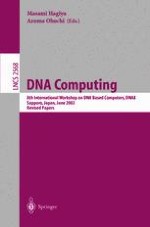2003 | OriginalPaper | Buchkapitel
Unexpected Universality Results for Three Classes of P Systems with Symport/Antiport
verfasst von : Mihai Ionescu, Carlos Martín-Vide, Andrei PĂun, Gheorghe PĂun
Erschienen in: DNA Computing
Verlag: Springer Berlin Heidelberg
Enthalten in: Professional Book Archive
Aktivieren Sie unsere intelligente Suche, um passende Fachinhalte oder Patente zu finden.
Wählen Sie Textabschnitte aus um mit Künstlicher Intelligenz passenden Patente zu finden. powered by
Markieren Sie Textabschnitte, um KI-gestützt weitere passende Inhalte zu finden. powered by
Symport and antiport are biological ways of transporting molecules through membranes in “collaborating” pairs; in the case of symport the two molecules pass in the same direction, in the case of antiport the two molecules pass in opposite directions. Here we first survey the results about the computing power of membrane systems (P systems) using only symport/antiport rules (hence these systems compute only by using communication), then we introduce a novel way of defining the result of a computation in a membrane system: looking for the trace of certain objects in their movement through membranes. Rather unexpected, in this way we get characterizations of recursively enumerable languages by means of membrane systems with symport/antiport which work with multisets of objects (note the qualitative difference between the data structure used by computations - multisets: no ordering - and the data structure of the output - strings: linear ordering). A similar remark holds true for the case of analysing P systems: the sequence of certain distinguished objects taken from the environment during a computation is the string recognized by the computation. We also survey universality results from this area, with sketched proofs.
